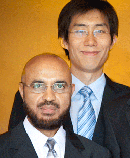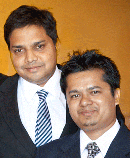|

The MBA team that placed first in a national business simulation have enjoyed an education at MUM that brings about total development of life, self-realization, through Consciousness-Based Education.

The simulation was part of Dr. Andrew Bargerstock's class, U.S. and International Accounting Practices.

Abdul Sheikh (Pakistan) and Peng Wang (China) were part of the team that placed first in the nation.

Chittaranjan Sahu (India) and Ganesh Baniya (Nepal) contributed their decision-making skills to the team of 4 international students.
|
|
From Maharishi University of Management's website
2 September 2011
An Accounting MBA team from Maharishi University of Management finished 1st in a nationwide business simulation competition among 137 teams over a recent six-month period.
Although CAPSIM offers official Challenge Competitions where results are published and winners are officially recognized, MUM instead participated in CAPSIM's Foundation Simulation — a continuously rolling event available on-line where participant teams are evaluated against all teams who have participated in the previous six months. The claim of #1 ranking by the MUM’s Baldwin team is based on the team’s total score of 830 points which placed them in the 99th percentile at the end of the simulation on August 4, 2011.
The simulation compared integrated decision-making skills over eight rounds of decision-making. The simulation creator, Capsim Management Simulations, Inc. of Northfield, Illinois, is the largest business game provider in the USA.
The Baldwin team is composed of (left to right in photo above) Peng Wang (China), Ganesh Baniya (Nepal), Abdul Sheikh (Pakistan), and Chittaranjan Sahu (India).
A second team from MUM also performed very well by placing in the 82nd percentile: (left to right in photo above) Stella Mangwa (Cameroon), Tricia Walrond (Barbados), Nikoo Dolati (Iran), and Monica Bayung (Cameroon).
The simulation was part of Dr. Andrew Bargerstock's class, U.S. and International Accounting Practices. Dr. Bargerstock stated, “When our MBA students perform so well against some of the best business schools in the USA, it validates the quality of their integrated decision-making skills and builds confidence that they can compete effectively in the challenging international business environment.”
The game scenario takes place in the sensor products industry when it is assumed that the Securities Exchange Commission has broken a monopoly into smaller companies. Each team assumes the role of a company and begins with an equal market share and financial resources.
Each round of decision-making represents a year of business activity. Decisions require that students analyze and assess a variety of reports about the industry, competitors, and its own past performance results. Students must decide on research and development strategies, marketing tactics, sales and production forecasts, financing requirements, human resource management tactics, and total quality management (TQM) initiatives.
Teams are evaluated on their abilities to maximize growth across a set of metrics based on Harvard's Balanced Scorecard concept that includes four sets of performance measures: financial results, customer perspectives, internal business development, and learning and growth initiatives. The total score on this simulation is based on scores for each of the eight rounds (short-term view) and accumulated Recap score (long-term view) across a variety of Balanced Scorecard metrics.
After four practice rounds the simulation is reset and, over the course of three weeks, the team’s submitted decisions for eight competitive rounds. After each round, the teams view the results as seen in financial statements and a variety of reports. All teams can view the results of all other teams at their school.
Both strong analytical skills and informed intuition are valuable for simulation decision-making. The Baldwin Team reports its success came from a combination of good decisions about product pricing, building customer awareness, product innovation, automation of production facilities, controlled expansion of capacity, cost control, training and development of personnel, and sound financing strategies.
All students who participated in the simulation expressed appreciation for the opportunity to learn about executive decision-making and small group dynamics.
© Copyright 2011 Maharishi University of Management
|





